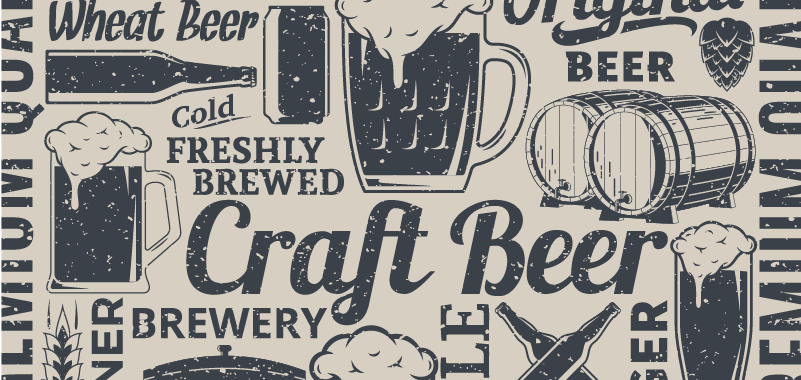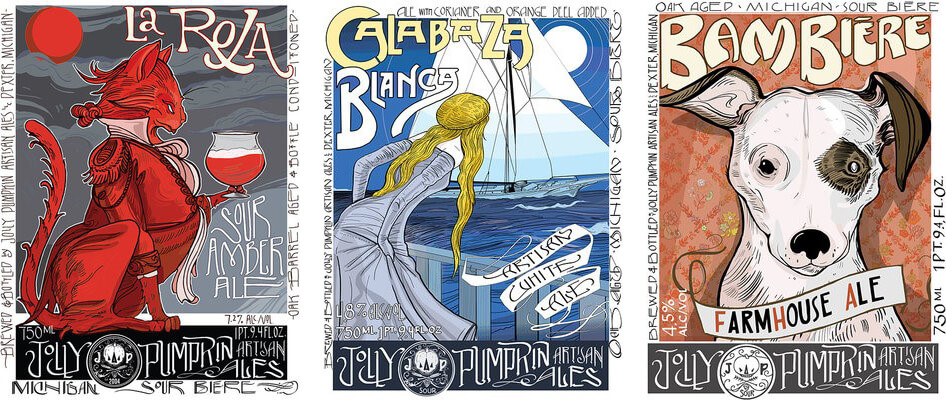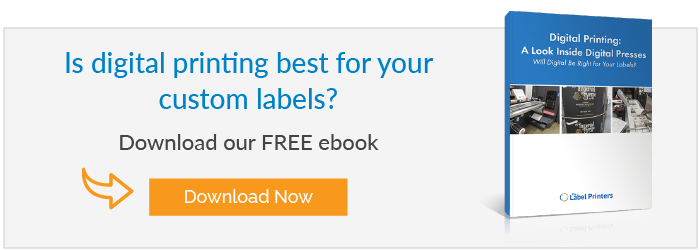
A new generation of innovative brewers usually – and deservedly – gets the glory for expanding the palates of beer nerds and everyday consumers with artisanal hops, botanical ingredients, and barrel aging.
But let’s take a moment to wonder where the current craft brew craze would be without the boundless imaginations of beer label designers, the unsung heroes of the microbrew world.
Just as craft brewers have moved America’s taste expectations from bland to bold, beer label designers have shifted how we visually experience beer bottles and cans. Peruse the shelves of your local beer specialty store (or even just a gas station), and you’ll find representatives of nearly every design style, from classic to cutting-edge, maximalist to minimalist, irreverent to elegant.
BeerAdvocate (the web’s “go-to resource for beer”) recently honored the work of craft brew label designers with a profile of some of the best, highlighting Adam B. Forman, a tattoo-artist-turned-label-designer who works with Michigan-based Jolly Pumpkin Artisan Ales.
The BeerAdvocate article is brimming with food-for-thought (or should it be brews-for-thought?) for craft breweries looking to design eye-catching, brand-defining labels. Here are some of our takeaways:
1. A Great Designer Will Find Their Own Inspiration
The BeerAdvocate profile introduces Forman working in his studio, trying to bring Jolly Pumpkin’s hazy sour IPA, “Losing Our Ledges”, to life: “Like many artists, his process starts out with little more than a name or concept.”
Jolly Pumpkin gives Forman minimal guardrails when it comes to defining the visual language of a craft brew. Often, says Jolly Pumpkin founder Ron Jeffries, he’ll give Forman direction and Forman will come back with something completely different – and better. Forman describes his relationship with Jolly Pumpkin as “improvisational,” saying, “[W]e just let each other do our thing.”
The lesson here? Often, the ideal results come from getting out of the way and letting your label designer do what they do best. The key is finding a designer whose vision aligns with how you see your brewery, how your customers see you, and what you aspire to be.
As Forman says about Jolly Pumpkin, if they were brewing pilsners and stouts, “I’m not sure if what I do would be as appropriate.”
Forman’s design aesthetic for Jolly Pumpkin tends towards an art nouveau style that echoes classic alcohol advertising of the late 19th and early 20th centuries. (What’s old is new again. The vintage look is a major current design trend.)
Some of our favorites include Forman’s design for La Roja sour amber ale, Calabaza Blanca sour artisan white ale, and Bam Bière sour farmhouse ale (pictured below from left to right).

2. The Beer World Can Move Slow – And Then Really Fast
Forman’s work on Losing Our Ledges jumped to the top of his to-do list as the aged brew suddenly became ready for bottling. The brewer’s art involves knowing exactly when a beer has hit its peak, and the timelines can be unpredictable. Designers need to be adaptable.
As craft brewers branch out into ever-expanding styles, responding to consumer demand for unique flavor profiles, designers must keep pace. Another designer featured in the BeerAdvocate article, Mike Van Hall, who works with Stillwater Artisanal and Aslin Beer Company, said he completed over 100 labels last year.
“I try and make sure that each one is novel and thoughtful and I’m not calling it in on any of them,” Van Hall told BeerAdvocate.
Label printers must be responsive, as well. As soon as a barrel-aged beer is ready, the beer must be named, packaged, labeled, and shipped within a very short amount of time. Noon Whistle brewmaster Paul Kreiner told us earlier this year that a quick turnaround time impressed him when working with the Label Printers.
Some of the label designers interviewed by BeerAdvocate said software tools have helped them boost their efficiency. One designer said switching from hand-drawn artwork to Adobe Illustrator allowed him to “reuse certain bits and pieces down the road.”
The right design software can help reduce back-and-forth discussions with your label printer, as well. We listed Adobe Illustrator as one of our preferred tools for creating a print-ready file.
3. Creative Label Design Can Help Your Beer Stand Out
BeerAdvocate says we’re living in a “golden age of label design,” brought on by competition among thousands of craft breweries for consumer attention. Designers like Adam Forman are so valuable to craft brewers because they can help attract new fans in a crowded marketplace.
“No one will taste a beer they are not compelled to pick up,” says Stillwater founder Brian Strumke in the BeerAdvocate article.
The point doesn’t just apply to the beer industry. Consumers, in general, make snap judgements about brands based on only a few visual cues. Labels have a lot of work to accomplish and very little time to do it. Great label design will rise above the competition, tell a story that resonates with buyers, and establish a memorable brand identity – all in the space of seconds.
The label on your craft beer isn’t merely an afterthought. It’s a key element of your brand and an essential part of the drinking experience. For a label on the outside of your bottle that’s as appealing as the beverage inside, it helps to work with an experienced partner.
At the Label Printers, we have helped countless brands create shelf- and cellar-worthy labels that stand up and stand out. We understand the need for speed and flexibility in the brewing industry, and we have the equipment and staff to make it happen. Click here to view our portfolio of food and beverage work.

